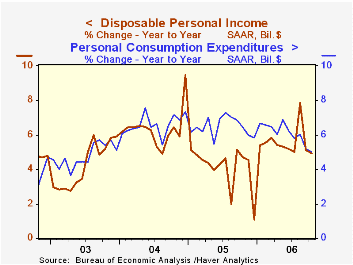 Global| Nov 30 2006
Global| Nov 30 2006U.S. Personal Income Gain Light, Core Prices Firmer
by:Tom Moeller
|in:Economy in Brief
Summary
Personal income for October rose a bit less than expectations with a 0.4% increase after an unrevised 0.5% September gain. The disappointment in last month's income gain, however, was confined to a 3.9% (-8.7% y/y) decline in rental [...]

Personal income for October rose a bit less than expectations with a 0.4% increase after an unrevised 0.5% September gain.
The disappointment in last month's income gain, however, was confined to a 3.9% (-8.7% y/y) decline in rental income and a slim 0.1% (2.4% y/y) increase in proprietors' income.
Wage & salary disbursements jumped 0.6% (5.9% y/y) after an upwardly revised like gain during September. Wages in the private service-producing industries surged 0.7% (6.4% y/y) and factory sector wages grew 0.6% (2.8% y/y) following an upwardly revised 0.1% September uptick. Revisions to the figures for April through September lowered the level of wages & salaries.
Disposable personal income increased 0.3% (4.9% y/y) after an unrevised 0.5% September increase. Personal taxes jumped 1.2% (12.1% y/y).
Personal consumption rose 0.2% after the downwardly revised 0.2% September decline. Expectations had been for a 0.1% increase. When adjusted for the 0.2% decline in prices, real consumer spending rose 0.4%. A 2.8% m/m decline in unit vehicle sales last month held back the gain in PCE along with a 9.8% m/m decline (-16.8% y/y) in spending on gasoline & oil.
The PCE chain price index fell 0.2%, helped by last month's 12.1% decline in retail gasoline prices. Gasoline prices in November are down another 0.7% m/m. The 0.2% rise in prices less food & energy prices was a bit firmer than expectations for a 0.1% uptick. In addition, the three month change in core prices crept higher to 2.7% (AR).
Interest income rose 0.4% (7.6% y/y) while dividend income jumped another 1.1% (11.6% y/y).
The personal savings rate was a slightly less negative -0.6% last month but so far in 2006 has averaged -0.9%. Should the Decline in the Personal Saving Rate Be a Cause for Concern? from the Federal Reserve Bank of Kansas City is available here.
The Fed's latest Beige Book covering economic conditions around the country can be found here.
| Disposition of Personal Income | October | September | Y/Y | 2005 | 2004 | 2003 |
|---|---|---|---|---|---|---|
| Personal Income | 0.4% | 0.5% | 5.8% | 5.2% | 6.2% | 3.2% |
| Personal Consumption | 0.2% | -0.2% | 5.0% | 6.5% | 6.6% | 4.8% |
| Savings Rate | -0.6% | -0.7% | -0.3% (Oct. '05) | -0.4% | 2.0% | 2.1% |
| PCE Chain Price Index | -0.2% | -0.3% | 1.5% | 2.9% | 2.6% | 2.0% |
| Less food & energy | 0.2% | 0.2% | 2.4% | 2.1% | 2.0% | 1.4% |
Tom Moeller
AuthorMore in Author Profile »Prior to joining Haver Analytics in 2000, Mr. Moeller worked as the Economist at Chancellor Capital Management from 1985 to 1999. There, he developed comprehensive economic forecasts and interpreted economic data for equity and fixed income portfolio managers. Also at Chancellor, Mr. Moeller worked as an equity analyst and was responsible for researching and rating companies in the economically sensitive automobile and housing industries for investment in Chancellor’s equity portfolio. Prior to joining Chancellor, Mr. Moeller was an Economist at Citibank from 1979 to 1984. He also analyzed pricing behavior in the metals industry for the Council on Wage and Price Stability in Washington, D.C. In 1999, Mr. Moeller received the award for most accurate forecast from the Forecasters' Club of New York. From 1990 to 1992 he was President of the New York Association for Business Economists. Mr. Moeller earned an M.B.A. in Finance from Fordham University, where he graduated in 1987. He holds a Bachelor of Arts in Economics from George Washington University.






